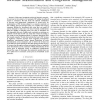Free Online Productivity Tools
i2Speak
i2Symbol
i2OCR
iTex2Img
iWeb2Print
iWeb2Shot
i2Type
iPdf2Split
iPdf2Merge
i2Bopomofo
i2Arabic
i2Style
i2Image
i2PDF
iLatex2Rtf
Sci2ools
116
click to vote
INFOCOM
2010
IEEE
2010
IEEE
Pricing under Constraints in Access Networks: Revenue Maximization and Congestion Management
Abstract—This paper investigates pricing of Internet connectivity services in the context of a monopoly ISP selling broadband access to consumers. We first study the optimal combination of flat-rate and usage-based components in access price for maximization of ISP revenue subject to a capacity constraint on the resulting data-rate demand. Next, we consider time-varying consumer utilities for broadband data rates that can result in uneven demand for data-rate over time. Practical considerations limit the viability of altering prices over time to smoothen out the demanded data-rate. Despite such constraints on pricing, our analysis reveals that the ISP can retain the revenue by setting a low usage fee and dropping packets of consumer demanded data that exceed capacity. We also characterize the loss in ISP revenue if regulatory attention prevents such congestion management. Regulatory requirements further impose limitations on price discrimination across consumers, and we derive the ...
Access Price | Communications | INFOCOM 2010 | ISP Revenue | Pricing |
Related Content
| Added | 28 Jan 2011 |
| Updated | 28 Jan 2011 |
| Type | Journal |
| Year | 2010 |
| Where | INFOCOM |
| Authors | Prashanth Hande, Mung Chiang, A. Robert Calderbank, Junshan Zhang |
Comments (0)

